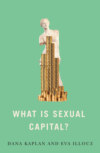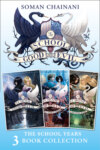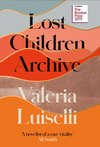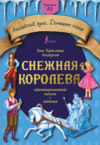Kitabı oku: «Fairy Tales of Hans Christian Andersen», sayfa 21
III. THE UNCLE
Rudy arrived at last at his uncle's house, and was thankful to find the people like those he had been accustomed to see. There was only one cretin amongst them, a poor idiot boy, one of those unfortunate beings who, in their neglected conditions, go from house to house, and are received and taken care of in different families, for a month or two at a time.
Poor Saperli had just arrived at his uncle's house when Rudy came. The uncle was an experienced hunter; he also followed the trade of a cooper; his wife was a lively little person, with a face like a bird, eyes like those of an eagle, and a long, hairy throat. Everything was new to Rudy – the fashion of the dress, the manners, the employments, and even the language; but the latter his childish ear would soon learn. He saw also that there was more wealth here, when compared with his former home at his grandfather's. The rooms were larger, the walls were adorned with the horns of the chamois, and brightly polished guns. Over the door hung a painting of the Virgin Mary, fresh alpine roses and a burning lamp stood near it. Rudy's uncle was, as we have said, one of the most noted chamois hunters in the whole district, and also one of the best guides. Rudy soon became the pet of the house; but there was another pet, an old hound, blind and lazy, who would never more follow the hunt, well as he had once done so. But his former good qualities were not forgotten, and therefore the animal was kept in the family and treated with every indulgence. Rudy stroked the old hound, but he did not like strangers, and Rudy was as yet a stranger; he did not, however, long remain so, he soon endeared himself to every heart, and became like one of the family.
"We are not very badly off, here in the canton Valais," said his uncle one day; "we have the chamois, they do not die so fast as the wild goats, and it is certainly much better here now than in former times. How highly the old times have been spoken of, but ours is better. The bag has been opened, and a current of air now blows through our once confined valley. Something better always makes its appearance when old, worn-out things fail."
When his uncle became communicative, he would relate stories of his youthful days, and farther back still of the warlike times in which his father had lived. Valais was then, as he expressed it, only a closed-up bag, quite full of sick people, miserable cretins; but the French soldiers came, and they were capital doctors, they soon killed the disease and the sick people, too. The French people knew how to fight in more ways than one, and the girls knew how to conquer too; and when he said this the uncle nodded at his wife, who was a French woman by birth, and laughed. The French could also do battle on the stones. "It was they who cut a road out of the solid rock over the Simplon – such a road, that I need only say to a child of three years old, 'Go down to Italy, you have only to keep in the high road,' and the child will soon arrive in Italy, if he followed my directions."
Then the uncle sang a French song, and cried, "Hurrah! long live Napoleon Buonaparte." This was the first time Rudy had ever heard of France, or of Lyons, that great city on the Rhone where his uncle had once lived. His uncle said that Rudy, in a very few years, would become a clever hunter, he had quite a talent for it; he taught the boy to hold a gun properly, and to load and fire it. In the hunting season he took him to the hills, and made him drink the warm blood of the chamois, which is said to prevent the hunter from becoming giddy; he taught him to know the time when, from the different mountains, the avalanche is likely to fall, namely, at noontide or in the evening, from the effects of the sun's rays; he made him observe the movements of the chamois when he gave a leap, so that he might fall firmly and lightly on his feet. He told him that when on the fissures of the rocks he could find no place for his feet, he must support himself on his elbows, and cling with his legs, and even lean firmly with his back, for this could be done when necessary. He told him also that the chamois are very cunning, they place lookers-out on the watch; but the hunter must be more cunning than they are, and find them out by the scent.
One day, when Rudy went out hunting with his uncle, he hung a coat and hat on an alpine staff, and the chamois mistook it for a man, as they generally do. The mountain path was narrow here; indeed it was scarcely a path at all, only a kind of shelf, close to the yawning abyss. The snow that lay upon it was partially thawed, and the stones crumbled beneath the feet. Every fragment of stone broken off struck the sides of the rock in its fall, till it rolled into the depths beneath, and sunk to rest. Upon this shelf Rudy's uncle laid himself down, and crept forward. At about a hundred paces behind him stood Rudy, upon the highest point of the rock, watching a great vulture hovering in the air; with a single stroke of his wing the bird might easily cast the creeping hunter into the abyss beneath, and make him his prey. Rudy's uncle had eyes for nothing but the chamois, who, with its young kid, had just appeared round the edge of the rock. So Rudy kept his eyes fixed on the bird, he knew well what the great creature wanted; therefore he stood in readiness to discharge his gun at the proper moment. Suddenly the chamois made a spring, and his uncle fired and struck the animal with the deadly bullet; while the young kid rushed away, as if for a long life he had been accustomed to danger and practised flight. The large bird, alarmed at the report of the gun, wheeled off in another direction, and Rudy's uncle was saved from danger, of which he knew nothing till he was told of it by the boy.
While they were both in pleasant mood, wending their way homewards, and the uncle whistling the tune of a song he had learnt in his young days, they suddenly heard a peculiar sound which seemed to come from the top of the mountain. They looked up, and saw above them, on the over-hanging rock, the snow-covering heave and lift itself as a piece of linen stretched on the ground to dry raises itself when the wind creeps under it. Smooth as polished marble slabs, the waves of snow cracked and loosened themselves, and then suddenly, with the rumbling noise of distant thunder, fell like a foaming cataract into the abyss. An avalanche had fallen, not upon Rudy and his uncle, but very near them. Alas, a great deal too near!
"Hold fast, Rudy!" cried his uncle; "hold fast, with all your might."
Then Rudy clung with his arms to the trunk of the nearest tree, while his uncle climbed above him, and held fast by the branches. The avalanche rolled past them at some distance; but the gust of wind that followed, like the storm-wings of the avalanche, snapped asunder the trees and bushes over which it swept, as if they had been but dry rushes, and threw them about in every direction. The tree to which Rudy clung was thus overthrown, and Rudy dashed to the ground. The higher branches were snapped off, and carried away to a great distance; and among these shattered branches lay Rudy's uncle, with his skull fractured. When they found him, his hand was still warm; but it would have been impossible to recognize his face. Rudy stood by, pale and trembling; it was the first shock of his life, the first time he had ever felt fear. Late in the evening he returned home with the fatal news, – to that home which was now to be so full of sorrow. His uncle's wife uttered not a word, nor shed a tear, till the corpse was brought in; then her agony burst forth. The poor cretin crept away to his bed, and nothing was seen of him during the whole of the following day. Towards evening, however, he came to Rudy, and said, "Will you write a letter for me? Saperli cannot write; Saperli can only take the letters to the post."
"A letter for you!" said Rudy; "who do you wish to write to?"
"To the Lord Christ," he replied.
"What do you mean?" asked Rudy.
Then the poor idiot, as the cretin was often called, looked at Rudy with a most touching expression in his eyes, clasped his hands, and said, solemnly and devoutly, "Saperli wants to send a letter to Jesus Christ, to pray Him to let Saperli die, and not the master of the house here."
Rudy pressed his hand, and replied, "A letter would not reach Him up above; it would not give him back whom we have lost."
It was not, however, easy for Rudy to convince Saperli of the impossibility of doing what he wished.
"Now you must work for us," said his foster-mother; and Rudy very soon became the entire support of the house.
IV. BABETTE
Who was the best marksman in the canton Valais? The chamois knew well. "Save yourselves from Rudy," they might well say. And who is the handsomest marksman? "Oh, it is Rudy," said the maidens; but they did not say, "Save yourselves from Rudy." Neither did anxious mothers say so; for he bowed to them as pleasantly as to the young girls. He was so brave and cheerful. His cheeks were brown, his teeth white, and his eyes dark and sparkling. He was now a handsome young man of twenty years. The most icy water could not deter him from swimming; he could twist and turn like a fish. None could climb like he, and he clung as firmly to the edges of the rocks as a limpet. He had strong muscular power, as could be seen when he leapt from rock to rock. He had learnt this first from the cat, and more lately from the chamois. Rudy was considered the best guide over the mountains; every one had great confidence in him. He might have made a great deal of money as guide. His uncle had also taught him the trade of a cooper; but he had no inclination for either; his delight was in chamois-hunting, which also brought him plenty of money. Rudy would be a very good match, as people said, if he would not look above his own station. He was also such a famous partner in dancing, that the girls often dreamt about him, and one and another thought of him even when awake.
"He kissed me in the dance," said Annette, the schoolmaster's daughter, to her dearest friend; but she ought not to have told this, even to her dearest friend. It is not easy to keep such secrets; they are like sand in a sieve; they slip out. It was therefore soon known that Rudy, so brave and so good as he was, had kissed some one while dancing, and yet he had never kissed her who was dearest to him.
"Ah, ah," said an old hunter, "he has kissed Annette, has he? he has begun with A, and I suppose he will kiss through the whole alphabet."
But a kiss in the dance was all the busy tongues could accuse him of. He certainly had kissed Annette, but she was not the flower of his heart.
Down in the valley, near Bex, among the great walnut-trees, by the side of a little rushing mountain-stream, lived a rich miller. His dwelling-house was a large building, three storeys high, with little turrets. The roof was covered with chips, bound together with tin plates, that glittered in sunshine and in the moonlight. The largest of the turrets had a weather-cock, representing an apple pierced by a glittering arrow, in memory of William Tell. The mill was a neat and well-ordered place, that allowed itself to be sketched and written about; but the miller's daughter did not permit any to sketch or write about her. So, at least, Rudy would have said, for her image was pictured in his heart; her eyes shone in it so brightly, that quite a flame had been kindled there; and, like all other fires, it had burst forth so suddenly, that the miller's daughter, the beautiful Babette, was quite unaware of it. Rudy had never spoken a word to her on the subject. The miller was rich, and, on that account, Babette stood very high, and was rather difficult to aspire to. But said Rudy to himself, "Nothing is too high for a man to reach: he must climb with confidence in himself, and he will not fail." He had learnt this lesson in his youthful home.
It happened once that Rudy had some business to settle at Bex. It was a long journey at that time, for the railway had not been opened. From the glaciers of the Rhone, at the foot of the Simplon, between its ever-changing mountain summits, stretches the valley of the canton Valais. Through it runs the noble river of the Rhone, which often overflows its banks, covering fields and highways, and destroying everything in its course. Near the towns of Sion and St. Maurice, the valley takes a turn, and bends like an elbow, and behind St. Maurice becomes so narrow that there is only space enough for the bed of the river and a narrow carriage-road. An old tower stands here, as if it were guardian to the canton Valais, which ends at this point; and from it we can look across the stone bridge to the toll-house on the other side, where the canton Vaud commences. Not far from this spot stands the town of Bex, and at every step can be seen an increase of fruitfulness and verdure. It is like entering a grove of chestnut and walnut-trees. Here and there the cypress and pomegranate blossoms peep forth; and it is almost as warm as an Italian climate. Rudy arrived at Bex, and soon finished the business which had brought him there, and then walked about the town; but not even the miller's boy could be seen, nor any one belonging to the mill, not to mention Babette. This did not please him at all. Evening came on. The air was filled with the perfume of the wild thyme and the blossoms of the lime-trees, and the green woods on the mountains seemed to be covered with a shining veil, blue as the sky. Over everything reigned a stillness, not of sleep or of death, but as if Nature were holding her breath, that her image might be photographed on the blue vault of heaven. Here and there, amidst the trees of the silent valley, stood poles which supported the wires of the electric telegraph. Against one of these poles leaned an object so motionless that it might have been mistaken for the trunk of a tree; but it was Rudy, standing there as still as at that moment was everything around him. He was not asleep, neither was he dead; but just as the various events in the world – matters of momentous importance to individuals – were flying through the telegraph wires, without the quiver of a wire or the slightest tone, so, through the mind of Rudy, thoughts of overwhelming importance were passing, without an outward sign of emotion. The happiness of his future life depended upon the decision of his present reflections. His eyes were fixed on one spot in the distance – a light that twinkled through the foliage from the parlor of the miller's house, where Babette dwelt. Rudy stood so still, that it might have been supposed he was watching for a chamois; but he was in reality like a chamois, who will stand for a moment, looking as if it were chiselled out of the rock, and then, if only a stone rolled by, would suddenly bound forward with a spring, far away from the hunter. And so with Rudy: a sudden roll of his thoughts roused him from his stillness, and made him bound forward with determination to act.
"Never despair!" cried he. "A visit to the mill, to say good evening to the miller, and good evening to little Babette, can do no harm. No one ever fails who has confidence in himself. If I am to be Babette's husband, I must see her some time or other."
Then Rudy laughed joyously, and took courage to go to the mill. He knew what he wanted; he wanted to marry Babette. The clear water of the river rolled over its yellow bed, and willows and lime-trees were reflected in it, as Rudy stepped along the path to the miller's house. But, as the children sing —
"There was no one at home in the house,
Only a kitten at play."
The cat standing on the steps put up its back and cried "mew." But Rudy had no inclination for this sort of conversation; he passed on, and knocked at the door. No one heard him, no one opened the door. "Mew," said the cat again; and had Rudy been still a child, he would have understood this language, and known that the cat wished to tell him there was no one at home. So he was obliged to go to the mill and make inquiries, and there he heard that the miller had gone on a journey to Interlachen, and taken Babette with him, to the great shooting festival, which began that morning, and would continue for eight days, and that people from all the German settlements would be there.
Poor Rudy! we may well say. It was not a fortunate day for his visit to Bex. He had just to return the way he came, through St. Maurice and Sion, to his home in the valley. But he did not despair. When the sun rose the next morning, his good spirits had returned; indeed he had never really lost them. "Babette is at Interlachen," said Rudy to himself, "many days' journey from here. It is certainly a long way for any one who takes the high-road, but not so far if he takes a short cut across the mountain, and that just suits a chamois-hunter. I have been that way before, for it leads to the home of my childhood, where, as a little boy, I lived with my grandfather. And there are shooting matches at Interlachen. I will go, and try to stand first in the match. Babette will be there, and I shall be able to make her acquaintance."
Carrying his light knapsack, which contained his Sunday clothes, on his back, and with his musket and his game-bag over his shoulder, Rudy started to take the shortest way across the mountain. Still it was a great distance. The shooting matches were to commence on that day, and to continue for a whole week. He had been told also that the miller and Babette would remain that time with some relatives at Interlachen. So over the Gemmi Rudy climbed bravely, and determined to descend the side of the Grindelwald. Bright and joyous were his feelings as he stepped lightly onwards, inhaling the invigorating mountain air. The valley sunk as he ascended, the circle of the horizon expanded. One snow-capped peak after another rose before him, till the whole of the glittering Alpine range became visible. Rudy knew each ice-clad peak, and he continued his course towards the Schreckhorn, with its white powdered stone finger raised high in the air. At length he had crossed the highest ridges, and before him lay the green pasture lands sloping down towards the valley, which was once his home. The buoyancy of the air made his heart light. Hill and valley were blooming in luxuriant beauty, and his thoughts were youthful dreams, in which old age or death were out of the question. Life, power, and enjoyment were in the future, and he felt free and light as a bird. And the swallows flew round him, as in the days of his childhood, singing "We and you – you and we." All was overflowing with joy. Beneath him lay the meadows, covered with velvety green, with the murmuring river flowing through them, and dotted here and there were small wooden houses. He could see the edges of the glaciers, looking like green glass against the soiled snow, and the deep chasms beneath the loftiest glacier. The church bells were ringing, as if to welcome him to his home with their sweet tones. His heart beat quickly, and for a moment he seemed to have foregotten Babette, so full were his thoughts of old recollections. He was, in imagination, once more wandering on the road where, when a little boy, he, with other children, came to sell their curiously carved toy houses. Yonder, behind the fir-trees, still stood his grandfather's house, his mother's father, but strangers dwelt in it now. Children came running to him, as he had once done, and wished to sell their wares. One of them offered him an Alpine rose. Rudy took the rose as a good omen, and thought of Babette. He quickly crossed the bridge where the two rivers flow into each other. Here he found a walk over-shadowed with large walnut-trees, and their thick foliage formed a pleasant shade. Very soon he perceived in the distance, waving flags, on which glittered a white cross on a red ground – the standard of the Danes as well as of the Swiss – and before him lay Interlachen.
"It is really a splendid town, like none other that I have ever seen," said Rudy to himself. It was indeed a Swiss town in its holiday dress. Not like the many other towns, crowded with heavy stone houses, stiff and foreign looking. No; here it seemed as if the wooden houses on the hills had run into the valley, and placed themselves in rows and ranks by the side of the clear river, which rushes like an arrow in its course. The streets were rather irregular, it is true, but still this added to their picturesque appearance. There was one street which Rudy thought the prettiest of them all; it had been built since he had visited the town when a little boy. It seemed to him as if all the neatest and most curiously carved toy houses which his grandfather once kept in the large cupboard at home, had been brought out and placed in this spot, and that they had increased in size since then, as the old chestnut trees had done. The houses were called hotels; the woodwork on the windows and balconies was curiously carved. The roofs were gayly painted, and before each house was a flower garden, which separated it from the macadamized high-road. These houses all stood on the same side of the road, so that the fresh, green meadows, in which were cows grazing, with bells on their necks, were not hidden. The sound of these bells is often heard amidst Alpine scenery. These meadows were encircled by lofty hills, which receded a little in the centre, so that the most beautifully formed of Swiss mountains – the snow-crowned Jungfrau – could be distinctly seen glittering in the distance. A number of elegantly dressed gentlemen and ladies from foreign lands, and crowds of country people from the neighboring cantons, were assembled in the town. Each marksman wore the number of hits he had made twisted in a garland round his hat. Here were music and singing of all descriptions: hand-organs, trumpets, shouting, and noise. The houses and bridges were adorned with verses and inscriptions. Flags and banners were waving. Shot after shot was fired, which was the best music to Rudy's ears. And amidst all this excitement he quite forgot Babette, on whose account only he had come. The shooters were thronging round the target, and Rudy was soon amongst them. But when he took his turn to fire, he proved himself the best shot, for he always struck the bull's-eye.
"Who may that young stranger be?" was the inquiry on all sides. "He speaks French as it is spoken in the Swiss cantons."
"And makes himself understood very well when he speaks German," said some.
"He lived here, when a child, with his grandfather, in a house on the road to Grindelwald," remarked one of the sportsmen.
And full of life was this young stranger; his eyes sparkled, his glance was steady, and his arm sure, therefore he always hit the mark. Good fortune gives courage, and Rudy was always courageous. He soon had a circle of friends gathered round him. Every one noticed him, and did him homage. Babette had quite vanished from his thoughts, when he was struck on the shoulder by a heavy hand, and a deep voice said to him in French, "You are from the canton Valais."
Rudy turned round, and beheld a man with a ruddy, pleasant face, and a stout figure. It was the rich miller from Bex. His broad, portly person, hid the slender, lovely Babette; but she came forward and glanced at him with her bright, dark eyes. The rich miller was very much flattered at the thought that the young man, who was acknowledged to be the best shot, and was so praised by every one, should be from his own canton. Now was Rudy really fortunate: he had travelled all this way to this place, and those he had forgotten were now come to seek him. When country people go far from home, they often meet with those they know, and improve their acquaintance. Rudy, by his shooting, had gained the first place in the shooting-match, just as the miller at home at Bex stood first, because of his money and his mill. So the two men shook hands, which they had never done before. Babette, too, held out her hand to Rudy frankly, and he pressed it in his, and looked at her so earnestly, that she blushed deeply. The miller talked of the long journey they had travelled, and of the many towns they had seen. It was his opinion that he had really made as great a journey as if he had travelled in a steamship, a railway carriage, or a post-chaise.
"I came by a much shorter way," said Rudy; "I came over the mountains. There is no road so high that a man may not venture upon it."
"Ah, yes; and break your neck," said the miller; "and you look like one who will break his neck some day, you are so daring."
"Oh, nothing ever happens to a man if he has confidence in himself," replied Rudy.
The miller's relations at Interlachen, with whom the miller and Babette were staying, invited Rudy to visit them, when they found he came from the same canton as the miller. It was a most pleasant visit. Good fortune seemed to follow him, as it does those who think and act for themselves, and who remember the proverb, "Nuts are given to us, but they are not cracked for us." And Rudy was treated by the miller's relations almost like one of the family, and glasses of wine were poured out to drink to the welfare of the best shooter. Babette clinked glasses with Rudy, and he returned thanks for the toast. In the evening they all took a delightful walk under the walnut-trees, in front of the stately hotels; there were so many people, and such crowding, that Rudy was obliged to offer his arm to Babette. Then he told her how happy it made him to meet people from the canton Vaud, – for Vaud and Valais were neighboring cantons. He spoke of this pleasure so heartily that Babette could not resist giving his arm a slight squeeze; and so they walked on together, and talked and chatted like old acquaintances. Rudy felt inclined to laugh sometimes at the absurd dress and walk of the foreign ladies; but Babette did not wish to make fun of them, for she knew there must be some good, excellent people amongst them; she, herself, had a godmother, who was a high-born English lady. Eighteen years before, when Babette was christened, this lady was staying at Bex, and she stood godmother for her, and gave her the valuable brooch she now wore in her bosom.
Her godmother had twice written to her, and this year she was expected to visit Interlachen with her two daughters; "but they are old-maids," added Babette, who was only eighteen: "they are nearly thirty." Her sweet little mouth was never still a moment, and all that she said sounded in Rudy's ears as matters of the greatest importance, and at last he told her what he was longing to tell. How often he had been at Bex, how well he knew the mill, and how often he had seen Babette, when most likely she had not noticed him; and lastly, that full of many thoughts which he could not tell her, he had been to the mill on the evening when she and her father has started on their long journey, but not too far for him to find a way to overtake them. He told her all this, and a great deal more; he told her how much he could endure for her; and that it was to see her, and not the shooting-match, which had brought him to Interlachen. Babette became quite silent after hearing all this; it was almost too much, and it troubled her.
And while they thus wandered on, the sun sunk behind the lofty mountains. The Jungfrau stood out in brightness and splendor, as a back-ground to the green woods of the surrounding hills. Every one stood still to look at the beautiful sight, Rudy and Babette among them.
"Nothing can be more beautiful than this," said Babette.
"Nothing!" replied Rudy, looking at Babette.
"To-morrow I must return home," remarked Rudy a few minutes afterwards.
"Come and visit us at Bex," whispered Babette; "my father will be pleased to see you."














